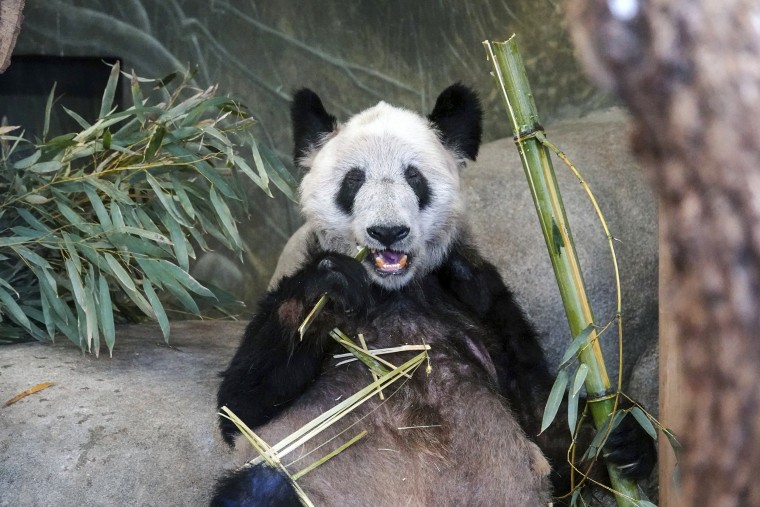Ya Ya the panda arrived in the U.S. 20 years ago as a fluffy gesture of China's friendship with America. But she returned home Thursday the subject of online nationalistic fervor.
News of her touching down in Shanghai was welcomed by Chinese social media users and some animal welfare activists who have been vocal in their concerns about Ya Ya’s care and condition at the Memphis Zoo in Tennessee, as well as her symbolic role in world affairs.
The zoo has denied mistreating the 190-pound panda, but her return trip to China marked the culmination of an intense online campaign that has mirrored the growing tensions between Washington and Beijing.
Ya Ya’s trip was closely followed online, and people shared screenshots tracking the animal’s flight path into Shanghai.
Vanessa Mai, a 22-year-old English student from Guangdong who told NBC News she had signed up to a campaign to save Ya Ya, said the panda was “getting a lot of exposure now and she will definitely be better off in China.”

Some animal welfare groups have questioned her condition and complained that her fur looks mangy and she looks thin. They have also blamed the zoo for the death in February of Ya Ya’s mate, Le Le — both contentions denied by the zoo as well as Chinese officials.
An image from Chinese broadcaster Phoenix News was also popular among Chinese social media users. It shows the bear relieving herself before the trip — and leaving muck as an apparent gift for keepers.
For decades, China deployed the iconic black-and-white animals in the service of so-called panda diplomacy. But this four-legged soft-power play by Beijing does not come free for recipient nations.
“They rent pandas for $1 million a year, usually on 10-year contracts,” said Stanley Rosen, a professor of political science and international relations at the University of Southern California’s U.S.-China Institute. “If a cub is born, that’s another $400,000 given back to China, all of which is put into conservation efforts.”
Despite the effort and money that keeping Ya Ya cost the zoo, and assurances from Chinese officials that she was in fact being treated properly, some Chinese social media users and animal rights groups around the world continued to raise concerns about her welfare.
“Refuse the meaningless panda diplomacy,” one person wrote on the Chinese microblogging site Weibo, where over 400 million users have responded to the #Yaya topic.
“Don’t let them be uprooted from their homeland again,” another wrote.
Even the hawkish state-run Global Times tabloid, the mouthpiece of the ruling Communist Party, has weighed in — linking the panda to Chinese-American relations, which have hit a low point amid tensions over Taiwan, the U.S. downing of a Chinese surveillance balloon and Beijing's growing assertiveness internationally.
“If this had not happened during a period when Washington is intensifying its containment and suppression of China, this matter would not have caused such a stir,” it said in an editorial. “Whether it’s a corn-milling plant, a crane, or an unidentified flying object, anything with a ‘China’ tag could be seen as a ‘threat’ by the U.S.”
Ya Ya, who is 22, arrived in Tennessee on loan from China in 2003, which China and the U.S. maintained much more cordial relations.
Thomas Clemson, a spokesperson for Panda Voices, a rights group that has worked in conjunction with In Defense of Animals, said that his group had reached out to the zoo after collecting evidence that the pandas looked unhealthy.
“We figured, if we message the zoo and try to build dialogue, maybe they’ll just let us help, which they didn’t. They kept stiff arms and they kept putting up walls,” he said.
Addressing Ya Ya’s condition, Memphis Zoo says on its website that her “familial genetics” and not nutrition were responsible for her small size.
“Ya Ya also lives with a chronic skin and fur condition which is inherently related to her immune system and directly impacted by hormonal fluctuations. This condition does not affect her quality of life but does occasionally make her hair look thin and patchy,” it adds. “The condition is closely monitored by our animal care team and veterinary staff.”
Before Le Le’s death, the zoo denied either bear was mistreated in a statement released in conjunction with the Chinese Association of Zoological Gardens, which oversees the loaning of pandas. The statement said they had “established an exchange mechanism for the health status of giant pandas, including monthly health reports and annual physical examination reports.”
“The blood examination results were basically normal and there were no abnormalities,” it continued, adding that “after a careful review of both monthly reports and a recent extensive annual physical examination, CAZG feels that the panda bears at the Memphis Zoo receive excellent care.”
Ahead of Ya Ya’s return, a spokesperson from China’s foreign ministry also said Wednesday that “the pandas were well taken care of by the park and deeply loved by the American people.”
Memphis Zoo said in separate statement Wednesday that she was accompanied on her journey home by its senior veterinarian and Chief Zoological Officer.
Despite the controversy, China “will want to keep the policy since it provides an alternative to the deteriorating relationship” with the U.S., Rosen said. “Let’s hope the U.S. doesn’t end the policy because of poor relations with China.”